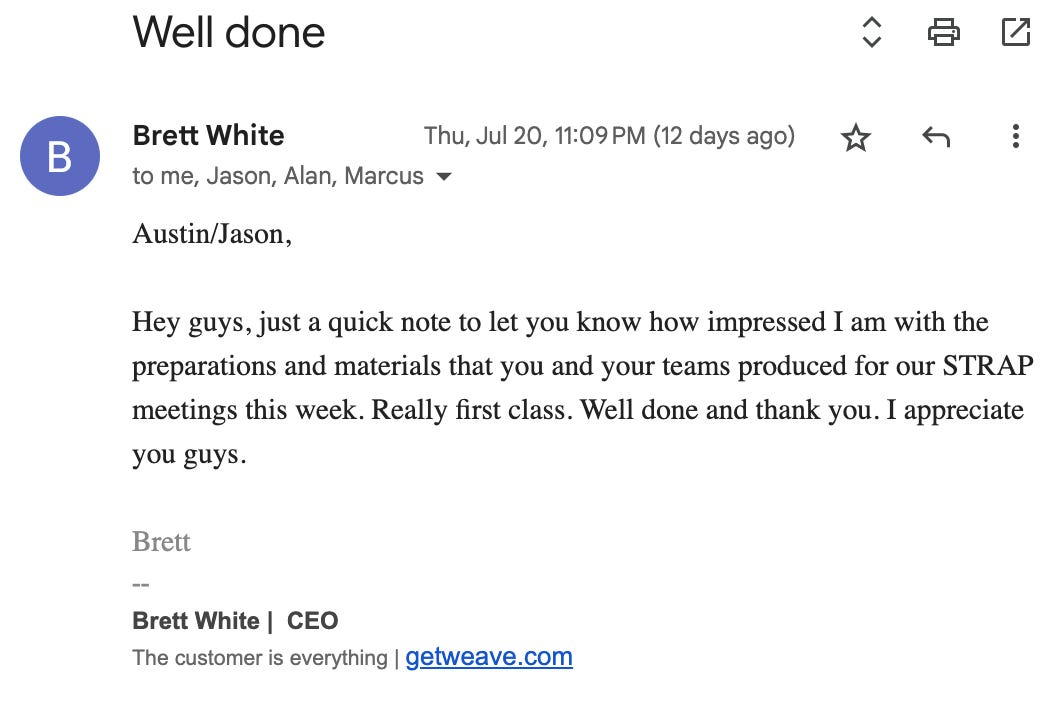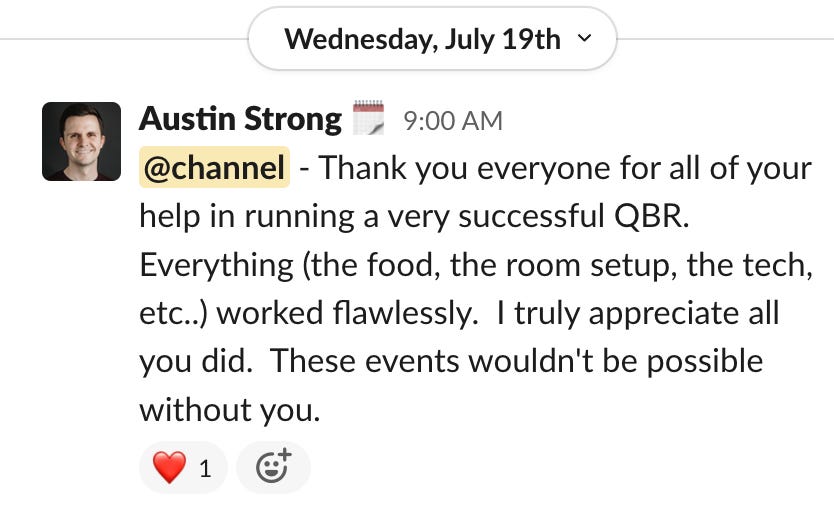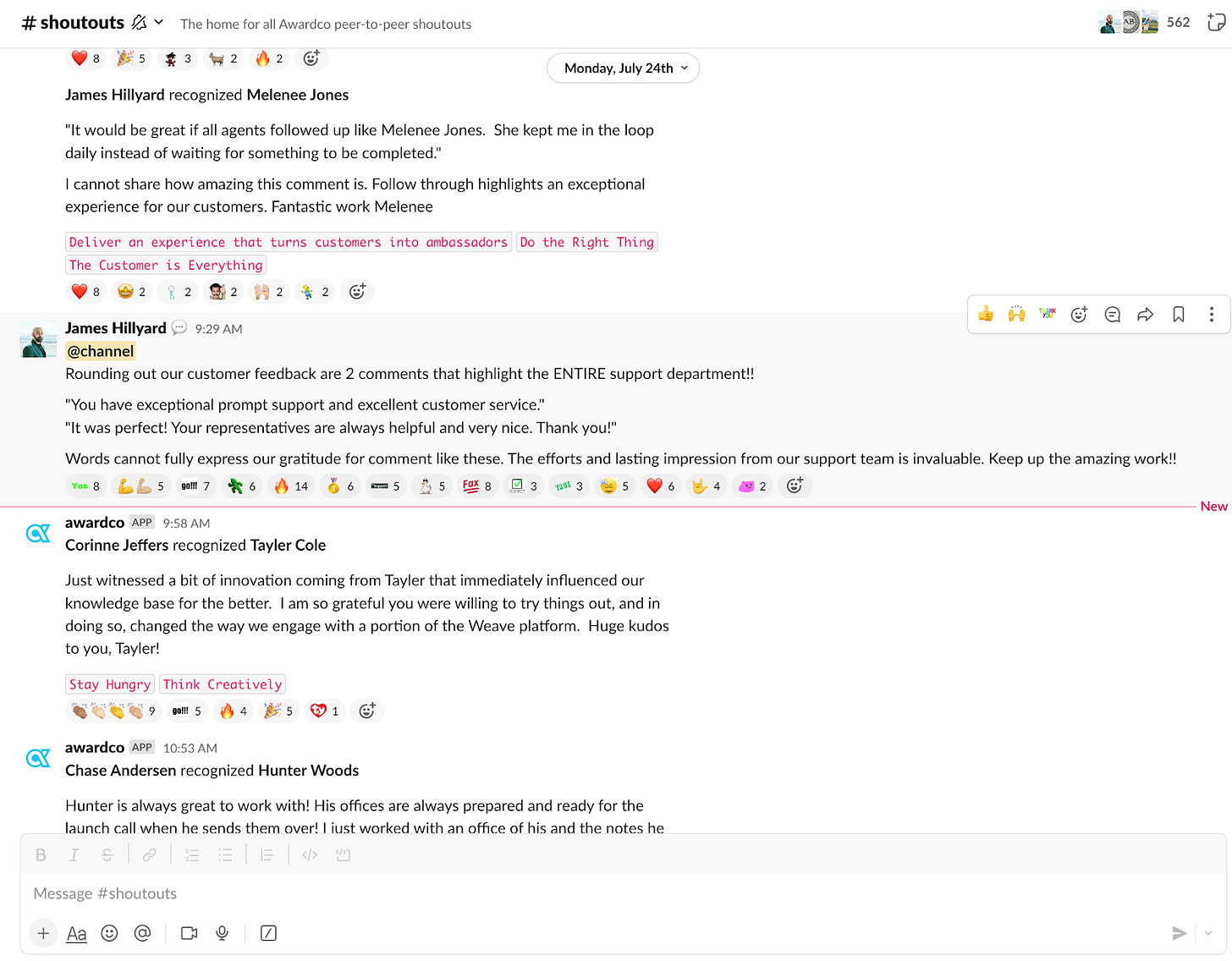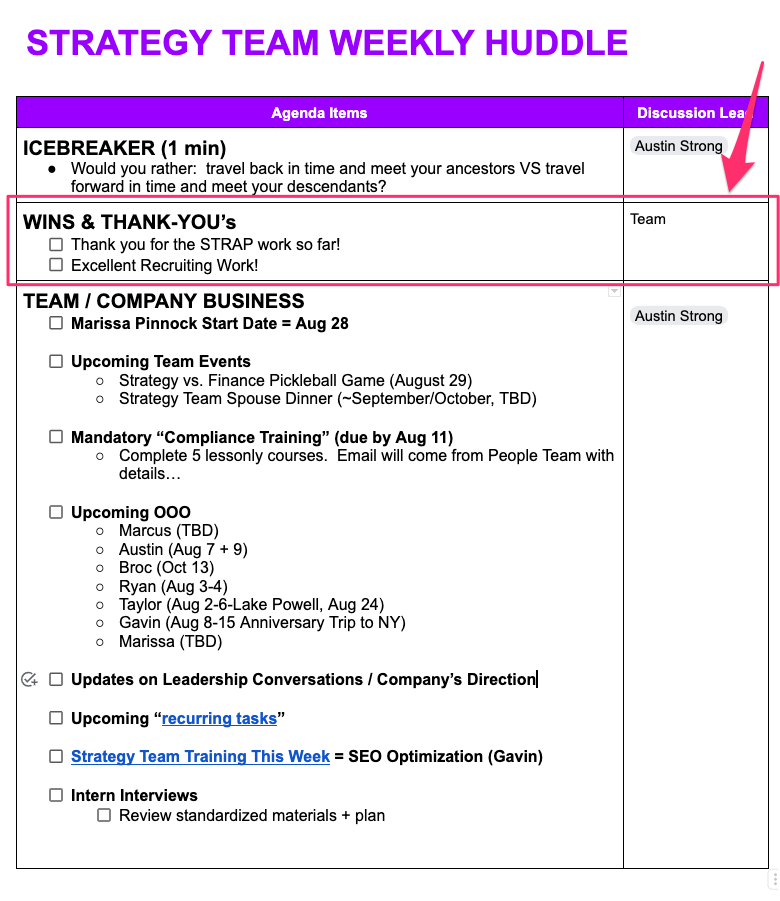If you want to craft a successful team & culture, start by giving credit where credit is due
The Perils of Holding Credit Too Close…
Early in my career, I worked for a manager who was always concerned about making sure that our team got full credit for any insights or work we did. On the surface, this seemed like a good thing. After all, everyone wants to have a solid resume come Year End Review Time so they have the best chance of promotion and pay increases. Plus, everyone wants to be acknowledged for the value they are bringing to the company.
But there were some hidden drawbacks to my manager’s “get credit at all costs” approach. He increasingly became unwilling to work with other departments out of fear that they’d “take some of the glory”. He was regularly distrustful about the motives of others every time they offered to collaborate with our team (I was warned multiple times about “colluding too closely” with other department leaders as my manager felt they would usurp our influence or try to “land grab” our departments responsibilities).
My manager’s approach to being seen doing “good work” ended up giving our team a reputation that “we were just there for ourselves and would only make other departments look bad in front of their bosses”. After a while, other departments stopped trying to work with our team altogether.
It took months to repair my department’s brand reputation after my boss left the company.
Why You Should Share Credit
If you want to build a team that has high morale and is unswervingly loyal to you as a leader, there are 2 simple things you need to do often: Give Credit and Express Gratitude
Both of these cost you absolutely nothing but have an enormous return that is hard to quantify but is quite tangible.
Think about the last time a co-worker (or even better, your boss) told you “good job” or thanked you for something you did. How did it change you? How did it change your feelings toward working with them?
There’s a lot of research that supports the notion of being grateful / giving credit on a regular basis. As just a few examples:
- When we see someone express gratitude we perceive them as being a better person and leader (Algoe and Dwyer, 2019 APA Study)
- Only 21% of employees who feel valued plan to look for a new job in the coming year (2012 APA Study)
- There is a massive spillover effect – Individuals become more trusting of each other and more likely to help each other out (2013 UC Berkely Paper)
Giving credit (or gratitude) is something I have found to be fundamental to exhibiting good leadership and engendering loyalty among your team. This notion was best captured by former U.S. president Dwight D. Eisenhower who once remarked:
“Leadership consists of nothing but taking responsibility for everything that goes wrong and giving your subordinates credit for everything that goes well”
How to Share Credit/Gratitude in the Business World
There are a lot of ways to show gratitude/credit in the business world, but let me share a few specific examples that I’ve found particularly powerful:
#1: Send a Thank You Note (and CC their boss…)
Over the past few months, I’ve been working closely with our VP of Finance + our executive leadership team to develop a detailed 3+ year strategy for our company. This has involved hundreds of man-hours and lots of coordination. Everything finally culminated in a 2-day executive offsite in Park City, Utah where we discussed the full plan in detail (see how to plan an offsite here)
The offsite was a big success and everyone left with a lot of exciting momentum for our call with the Board of Directors. But one of the best (and unexpected) things that happened was when we got this email from our CEO the day after our off-site had ended:

A couple of key things to note about this email:
- The gratitude was short, simple, but sincere. It felt very meaningful to have our CEO personally thank us for the work we did.
- Our CEO cc’d our bosses (the Chief Strategy Officer for me, and the Chief Financial Officer for Jason). This is a small, but very classy way to express gratitude: ensure that people who are putting in the work are getting credit in a manner that their direct manager can see it.
If you’re ever in the position to give a shout-out to someone who has done a good job on a project or helped you with a major company initiative, this is a great way to do it. You don’t have to be the CEO to send this kind of an email. Be sincere in your praise and make sure their boss/team knows they’ve put in the good work, and you’ll be amazed at how much something small like this means to a coworker.
Like what you’re reading so far? Share it with a friend/co-worker you think would enjoy this article as well…
#2: Send Regular “Thank You” Messages
In addition to Example #1 (copying their boss), you should also consider sending a private and personal thank you to anyone who helps you with something at work. These notes don’t need to be long or complex, but they are very appreciated. Get in the habit of sending these on a regular basis.
Here’s a quick example of one I sent a few weeks ago to a team at my company who had helped me pull together our Quarterly Business Review (QBR) meetings:

Note: You don’t always have to send a written message (although I think you should often). Saying thank you in person often works just as well. It can be in a formal sit down (ex: during a 1 on 1 session), giving credit to someone at the start of a meeting, or simply saying thanks when you bump into someone by the water cooler.
#3: Give a Shoutout to the “Stage Crew”
In my current role, I lead a lot of executive and company presentations. These are rarely my sole handiwork, but instead represent a lot of effort from my strategy team, other departments, executive assistants, etc…
But I’m usually the one on stage presenting the material. It can be tempting in these instances to pass off the work as primarily my own (simply by failing to mention the others who have pitched in). Don’t ever do this. People always come to resent those who take the full credit for work they’ve done. You need to always remember to acknowledge and fully credit those who are not present on the stage.
When I was in high school I noticed that our choral teacher would always make a special effort to direct the audience’s praise to the “stage crew” who had toiled behind the scenes to make the night’s entertainment a possibility. Privately she later told me “You always want the stage crew to be on your good side, because if you don’t they have the ability to make you look terrible to the world when you’re performing.”

One small way I like to do this is to open up any presentation with a “thank you” slide to the “stage crew” who has played a part in putting together the material. This is a way of ensuring that the audience knows the full effort that has gone into anything they’re about to see.

#4: Use Your Company’s Formal “Shout Out Channel” (if you have one)
Many companies have increasingly started using “employee recognition and rewards” software (ex: AwardCo or Motivosity) as a way of sharing thanks in a more formal manner with employees. Other companies simply use public “shout out” channels in Slack or MS Teams where you can publicly acknowledge or thank a coworker.
I’ll admit that I was skeptical of these kinds of channels when I first heard about them. I felt it was an artificial way to set up a culture of gratitude and didn’t think it would be something I would ever use.
I’ve been proven completely wrong on this point.
My company’s “shout out” channel has HUNDREDS of messages since it was launched, and there is a palpable difference in our culture because of it.

There is simply something very invigorating to seeing yourself thanked in a public (or monetary) manner, even if it’s small. Look for opportunities to give praise to those you work with often in these forums. As long as you’re sincere, it will always be appreciated.
If you haven’t set up a channel like this for your company I’d highly recommend it.
#5: Start Your Team Meetings with a “Wins & Thank You’s” Section
One minor thing my team has done that I’ve enjoyed is having a standing item on our weekly agenda called “Wins and Thank You’s”. We take 5 minutes at the beginning of our weekly standup to recognize specific team members for their contributions over the past week(s) and/or celebrate any wins our team has experienced together.
It’s a small thing, but I’d argue it’s one of the most popular items on our meeting agenda.

#6: Give Gifts / Compensation
Not all thank you’s have to be verbal. Gifts (and money) are often even more powerful ways of giving credit.
These often don’t have to be large gifts. Most companies I’ve been in have had a means for managers to send small “thank you prizes” (often simply a gift card of $50-100) that can be to a team member who went above and beyond). I was once gifted a pair of orange Nike Basketball Shoes (which I loved) as thanks for a project I did. I thought fondly of my manager every time I laced them up on the basketball court. Ditto for pairs of sunglasses, sweatshirts, cool Stance socks, or other company SWAG.
Perhaps the most important way you can say thanks is to go to bat for your team members when Year End Reviews come around. Your team needs to know that you’ll be championing for their financial futures and career development to reward them for the good work they’ve put in. This is the ultimate form of credit.
Get this right and your team will run through a brick wall for you. Get this wrong, and you’ll create a culture of resentment that will end up in high employee turnover.
As an example, my brother just left a prominent local tech company that was notorious for its subpar promotion process. Despite being a top performer by every metric he was denied a promotion for 2 years in a row because the company was extremely sparse in handing out pay changes or title increases. He (and many other folks) started to leave in droves out of frustration that their work wasn’t being recognized.
Contrast this with the time one of my former managers once surprised me with an “off-cycle” promotion and pay range simply because he felt I deserved it. When I learned that he had pounded the table for me to get what he felt I “deserved” to senior leadership I felt an enormous sense of loyalty and gratitude to him as a leader and mentor.
Conclusion
Giving credit/gratitude has a karmic effect. It’s been my experience that leaders who demonstrate this to their teams and co-workers will receive the same treatment (and in even greater measure).
It costs you nothing and has unlimited upside.
“No one who achieves success does so without the help of others. The wise and confident acknowledge this help with gratitude.” – Alfred North Whitehead


